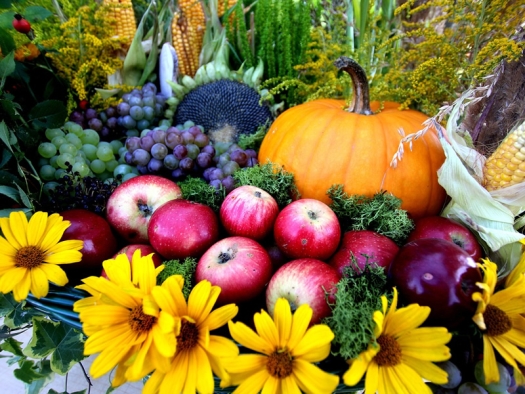PumpkinsApplesGrapesSunflowers.jpg

Photo by wolfik_kalisz / Pixabay
Breast Health
Let’s talk about breast health. October is #breasthealthawareness month, but while everyone is talking about screenings and early detection, I want to talk about prevention. Real prevention is about the lifestyle choices we make every day. Here are 3 to think about:
- Avoid Hormone-Disrupting Chemicals: Chemicals that mimic estrogen are commonly in lotions (parabens), plastics (phthalates), pesticides (glyphosate), and even cash register receipts (BPA).
- Eat the Rainbow: Colorful fruits, veggies, and spices are rich in antioxidants to support breast health. Some foods that are especially beneficial for breast health include broccoli, mushrooms, and turmeric.
- Reduce Alcohol: Alcohol can increase levels of estrogen. Compared to women who don't drink at all, women who have three alcoholic drinks per week have a 15% higher risk of breast cancer.
Breast health is not only an issue for women. Men and women alike can benefit from these suggestions.
Fall Superfoods to Stock in Your Kitchen
Fall is the time to cozy up with some comfort foods AND start supporting your immune function while you’re at it and what better way than with superfoods?
Pumpkins & Squash
Pumpkins are not just for carving! They’re packed with beta-carotene, vitamin C, and fiber. This is also the season for all varieties of squash, like butternut and acorn squash too.
Apples & Pears
Also a good source of vitamin C and fiber, these fruits have a lower glycemic index that sweeter fruits, like bananas or grapes. Look for organic options.
Kale & Greens
Fall is a great time to harvest kale and other dark green leafy vegetables that are rich in vitamin K, vitamin C, and beta-carotene.
Turmeric & Ginger
If you’re feeling a chill in the air, warm up with these antioxidant-rich spices. Perfect for soups, stir-fries, and even lattes!
Fall Reflection: Reflective Exercise for Fall
The fall season is about change. Letting go. So, what do you want to let go of?
Make this your journal prompt the next time you find yourself in the leafy shadows of a tree or cozying up on the couch with a cup of tea. Reflect on what it is you want to release so you can welcome new growth.
Halloween
Treats that aren’t candy! Save this post for some fun and healthy Halloween treats – perfect for parties, kids’ lunches, or snacking on trick-or-treat night.
Witch’s Fingers
Cut small rectangles out of a green bell pepper and wedge them into the end of cheese sticks to look like witch’s fingernails. Carve a few lines on the cheese to look like finger joints.
Clementine “Pumpkins”
Just peel some clementine oranges and stick a small piece of celery in the top to look like a pumpkin stem.
Pumpkin Hummus
Blend up some pumpkin with chickpeas, olive oil, and spices (try cumin, paprika, or cayenne to taste).
Mummy Mini Pizzas
Take your favorite bagels or gluten-free English muffins and build mini pizzas to look like mummies, with black olives as the eyes.
Enjoy your Halloween!
Coffee
Research Alert! Sure, the caffeine in coffee helps us feel more alert and focused.
But a new study shows there’s more to coffee’s brain-boosting effects than just caffeine.
In the study, healthy adults were given either coffee or caffeinated water, and researchers measured their brain activity with functional MRI scans.
Both groups showed changes in brain activity related to being more ready to engage in tasks. But coffee also boosted activity in areas of the brain related to working memory, cognitive control, and goal-directed behavior.
Basically, the coffee made people even more ready to be attentive and responsive than caffeine alone.
This is not so different from what we commonly see in studies on whole food or herbs. The whole is more than the sum of its parts.
Microbiome: Exciting Research about the Microbiome
One of the most common questions people ask is: Should I take a probiotic?
Probiotics are beneficial bacteria to populate the gut microbiome, and a general trend we see in research is that a more diverse microbiome (more variety of microorganisms) is associated with better health.
A new study has found yet another way to improve the microbiome: weight loss.
Regardless of whether people followed intermittent fasting or calorie restriction, weight loss led to more diversity of the microbiome AND (another sign of better health) changes in DNA methylation.
So why is this exciting?
Because it shows how resilient the body is. When we make changes in a positive direction toward health, our bodies benefit in ways we cannot even see and may never even know.
Still not convinced that gut health matters?
New research, published in Jama Dermatology, found significant differences in gut microbiome profiles between people who had melanoma and who did not. There were also differences between those who had early and later stage disease.
Conventional healthcare likes to separate the skin from the gut and from the brain etc., but evidence keeps piling up that all of these things relate AND that the microbiome could very well be at the center of it all.
Whether we’re dealing with a skin issue, hormonal changes, or emotional concerns, one core strategy in functional medicine is to help everyone optimize gut and microbiome health. This study is just more confirmation of why.
“Keep your face always toward the sunshine and shadows will fall behind you.” ~Walt Whitman
References
Picó-Pérez M, Magalhães R, Esteves M, et al. Coffee consumption decreases the connectivity of the posterior Default Mode Network (DMN) at rest. Front Behav Neurosci. 2023;17:1176382.
Hill EB, Konigsberg IR, Ir D, Frank DN, Jambal P, Litkowski EM, Lange EM, Lange LA, Ostendorf DM, Scorsone JJ, et al. The Microbiome, Epigenome, and Diet in Adults with Obesity during Behavioral Weight Loss. Nutrients. 2023; 15(16):3588.
Witt RG, Cass SH, Tran T, et al. Gut Microbiome in Patients With Early-Stage and Late-Stage Melanoma [published online ahead of print, 2023 Aug 30]. JAMA Dermatol. 2023;e232955.
Revised by Joanne Quinn, PhD; content provided by Wellnesswriter.com.


